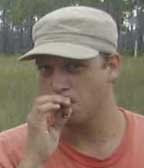
No, not a country singer, but a concept in landscaping. Actually, not really landscaping, as very little action is needed for those who have lawns, in fact no action is needed.
Modern lawns use way too many resources. I listen to the radio, and hear countless commercials about "So-in-so's weed and feed" product to be spread across hundreds of thousands of acres of green field, whose ultimate purpose is not quite certain. Fertilizers, herbicides, and pesticides used in the landscape reduce the overall fitness of the existing landscape (killing beneficial insects, and artificially pushing our plants growth like some sort of steroidal hormone). In addition, what isn't absorbed by the plants end up in our water supply, and/or oceans, rivers and lakes, threatening ourselves as well as existing ecosystems that we depend on. They also add to the carbon footprint (and are expensive to boot!). Modern lawns also require inordinate amounts of water, often drinking water, that we inundate with impunity during dry seasons, threatening the water supply we all depend on to sustain our own lives. So why are lawns so entrenched in our culture?
I have a few theories, visually, they provided a stylistic monochromatic scheme, sometimes pleasurable to our eyes. Lawns represent status dating back to European aristocracies, such as those vast fields surrounding Versailles. People who can afford to waste resources on redundant things appear to be "well off". Lawns also sustain the deeply intrinsic human behavioral need to manipulate one's environment. Regardless, it is time to grow up, and stop worrying about having a monoculture of one turf species. It is stupid and wasteful. Instead, embrace a new pastoral view of the world, and convert your lawn to an Urban Meadow.
Step 1: stop watering your lawn.
Step 2: stop using fertilizers, pesticides, and herbicides on your lawn.
Step 3: Pop open a beer, you are done. You are on your way to having an urban meadow.
Over time, weeds (both native and exotic) will fill in the spaces of your former lawn where it is doing poorly. These weeds are extremely beneficial to insects, who visit the flowers, or even use them as host plants (I counted over 36 butterfly species which use the lawn weeds in my yard). Many of these insects, such as wasps, are predatory on pest insects elsewhere in your yard. Reduce the frequency of mowing, as it is costly, and time consuming. You will notice an abundance of life in your new urban meadow. Yes it will appear brown during droughts, but you will also notice a great many new wildflowers.
Final Step: Educate your neighbors. Choose an opportune time such as: while they are mowing their yard...paying the yard man another fifty bucks...dumping an inordinate amount of chemicals on their grass.
We will all benefit from this approach to lawncare, and it requires nothing but to merely step away.
Modern lawns use way too many resources. I listen to the radio, and hear countless commercials about "So-in-so's weed and feed" product to be spread across hundreds of thousands of acres of green field, whose ultimate purpose is not quite certain. Fertilizers, herbicides, and pesticides used in the landscape reduce the overall fitness of the existing landscape (killing beneficial insects, and artificially pushing our plants growth like some sort of steroidal hormone). In addition, what isn't absorbed by the plants end up in our water supply, and/or oceans, rivers and lakes, threatening ourselves as well as existing ecosystems that we depend on. They also add to the carbon footprint (and are expensive to boot!). Modern lawns also require inordinate amounts of water, often drinking water, that we inundate with impunity during dry seasons, threatening the water supply we all depend on to sustain our own lives. So why are lawns so entrenched in our culture?
I have a few theories, visually, they provided a stylistic monochromatic scheme, sometimes pleasurable to our eyes. Lawns represent status dating back to European aristocracies, such as those vast fields surrounding Versailles. People who can afford to waste resources on redundant things appear to be "well off". Lawns also sustain the deeply intrinsic human behavioral need to manipulate one's environment. Regardless, it is time to grow up, and stop worrying about having a monoculture of one turf species. It is stupid and wasteful. Instead, embrace a new pastoral view of the world, and convert your lawn to an Urban Meadow.
Step 1: stop watering your lawn.
Step 2: stop using fertilizers, pesticides, and herbicides on your lawn.
Step 3: Pop open a beer, you are done. You are on your way to having an urban meadow.
Over time, weeds (both native and exotic) will fill in the spaces of your former lawn where it is doing poorly. These weeds are extremely beneficial to insects, who visit the flowers, or even use them as host plants (I counted over 36 butterfly species which use the lawn weeds in my yard). Many of these insects, such as wasps, are predatory on pest insects elsewhere in your yard. Reduce the frequency of mowing, as it is costly, and time consuming. You will notice an abundance of life in your new urban meadow. Yes it will appear brown during droughts, but you will also notice a great many new wildflowers.
Final Step: Educate your neighbors. Choose an opportune time such as: while they are mowing their yard...paying the yard man another fifty bucks...dumping an inordinate amount of chemicals on their grass.
We will all benefit from this approach to lawncare, and it requires nothing but to merely step away.

